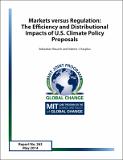Markets versus Regulation: The Efficiency and Distributional Impacts of U.S. Climate Policy Proposals
Author(s)
Rausch, S.; Karplus, V.J.
DownloadMITJPSPGC_Rpt263.pdf (4.133Mb)
Metadata
Show full item recordAbstract
Regulatory measures have proven the favored approach to climate change mitigation in the U.S., while market-based policies have gained little traction. Using a model that resolves the U.S. economy by region, income category, and sector-specific technology deployment opportunities, this paper studies the magnitude and distribution of economic impacts under regulatory versus market-based approaches. We quantify heterogeneity in the national response to regulatory policies, including a fuel economy standard and a clean or renewable electricity standard, and compare these to a cap–and–trade system targeting carbon dioxide or all greenhouse gases. We find that the regulatory policies substantially exceed the cost of a cap–and–trade system at the national level. We further show that the regulatory policies yield large cost disparities across regions and income groups, which are exaggerated by the difficulty of implementing revenue recycling provisions under regulatory policy designs.
Date issued
2014-05Publisher
MIT Joint Program on the Science and Policy of Global Change
Citation
Report 263
Series/Report no.
MIT Joint Program Report Series;263